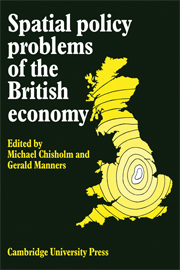Book contents
- Frontmatter
- Contents
- List of tables
- List of figures
- Preface
- 1 Geographical space: a new dimension of public concern and policy
- 2 Employment mobility in Britain
- 3 Leads and lags in inter-regional systems: a study of the cyclic fluctuations in the South West economy
- 4 Spatial structure of metropolitan England and Wales
- 5 Poverty and the urban system
- 6 Some economic and spatial characteristics of the British energy market
- 7 Growth, technical change and planning problems in heavy industry with special reference to the chemical industry
- 8 Freight transport costs, industrial location and regional development
- Index
1 - Geographical space: a new dimension of public concern and policy
Published online by Cambridge University Press: 21 May 2010
- Frontmatter
- Contents
- List of tables
- List of figures
- Preface
- 1 Geographical space: a new dimension of public concern and policy
- 2 Employment mobility in Britain
- 3 Leads and lags in inter-regional systems: a study of the cyclic fluctuations in the South West economy
- 4 Spatial structure of metropolitan England and Wales
- 5 Poverty and the urban system
- 6 Some economic and spatial characteristics of the British energy market
- 7 Growth, technical change and planning problems in heavy industry with special reference to the chemical industry
- 8 Freight transport costs, industrial location and regional development
- Index
Summary
The last decade has witnessed a growing public interest in the geography of economic and social change. The emotions aroused by the prospective impact and cost of the London motorway box, the vigour with which Scottish and Welsh interests canvassed for an aluminium smelter and the conflicting interests exposed by the Roskill Commission's search for a site suitable as an international airport are common currency amongst informed opinion today. The issues may at first sight appear diverse. Yet underlying the continuing debate on what should be done to counter the persistently high levels of unemployment in the less prosperous parts of the country and the much publicised ‘drift to the south’, and surrounding the many arguments over shifts in local or sub-regional patterns of land use together with the frequently associated issues of environmental quality, there is a single unifying theme. This is the uncertainties, for individuals and corporate groups, inherent in making decisions concerning the spatial allocation of resources and activities. This new focus of interest and debate, which has given a renewed importance to the study and interpretation of geographical space, stems from the convergence of four developments in particular.
Social versus spatial inequalities
Great advances have been made in Britain during the present century in the attempt to equalise opportunities and conditions between different socio-economic classes. Poverty and inequality still exist, to a degree that varies according to the definitions employed.
- Type
- Chapter
- Information
- Spatial Policy Problems of the British Economy , pp. 1 - 23Publisher: Cambridge University PressPrint publication year: 1971
- 2
- Cited by



